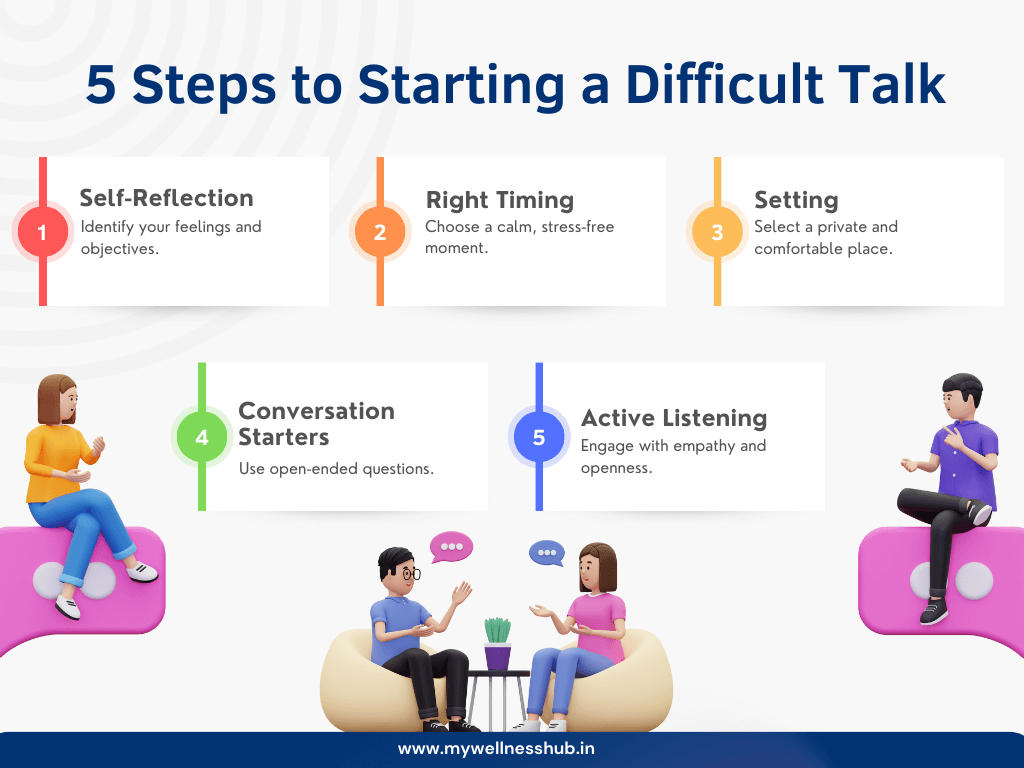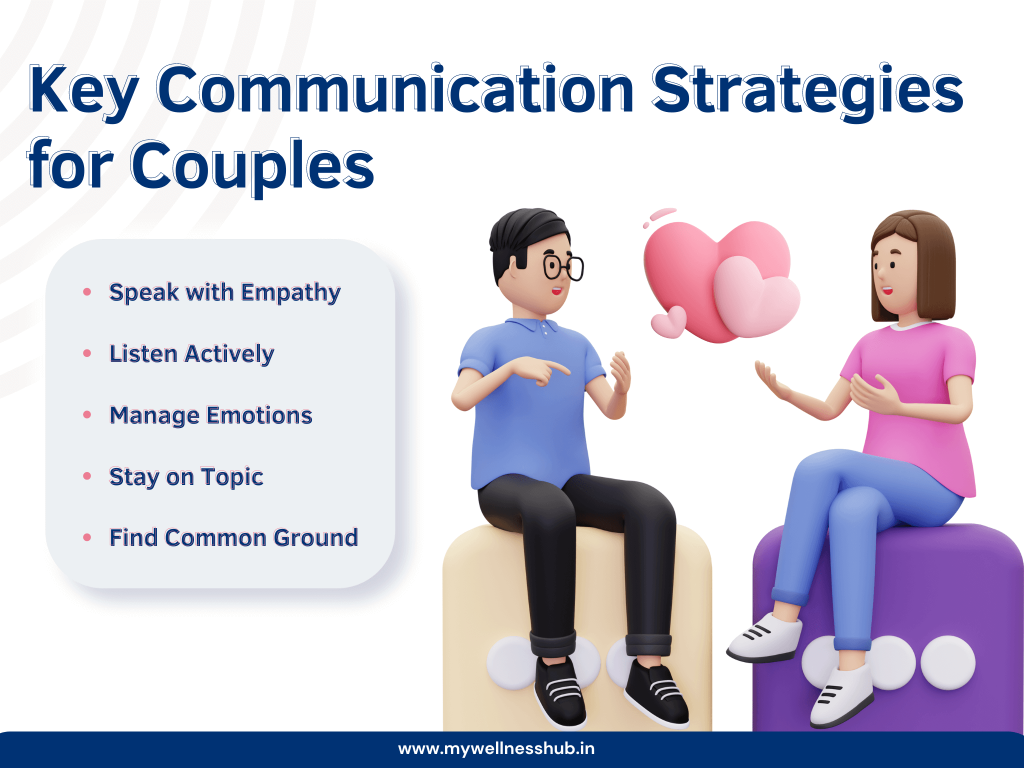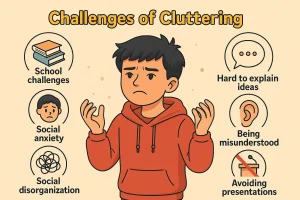Talk It Out: Secrets to Strong Marriage Communication
By Prapoorna M
Last Updated: April 22, 2024
Navigating the waters of marriage requires more than just love—it demands open and honest communication, a true compass that guides couples through all seasons of their relationship. Communication is the bridge that not only connects two hearts but also allows for the flow of love and understanding. Yet, there are times in even the closest partnerships when initiating tough conversations feels daunting. These difficult discussions are crucial—they are the catalysts for change, healing, and deeper intimacy. Overcoming the fear of these talks and facing issues together is not just beneficial; it’s essential for a strong, resilient marriage.
Topics for Tough Conversations in Marriage
| Topic | Why It’s Important | Tips for Discussion |
|---|---|---|
| Finances | Financial issues are a common cause of stress in marriages. Open discussions can set mutual financial goals and expectations. | – Be honest about your current financial situation. – Create a joint budget or savings plan. – Discuss financial priorities and compromises. |
| Parenting Styles | Differing parenting styles can lead to conflicts. It’s vital to present a united front for effective child-rearing. | – Share your own upbringing experiences. – Agree on core values you want to instill in your children. – Be open to compromise and external advice. |
| Career Goals | Career aspirations can impact time spent together, relocation decisions, and overall lifestyle. | – Discuss long-term career aspirations and what they mean for your family. – Support each other’s professional development. – Balance career and family time. |
| In-Laws Relationships | The dynamics with in-laws can influence your marriage’s harmony. Setting boundaries is essential. | – Express feelings without blaming. – Discuss and set boundaries together. – Plan how to handle future conflicts as a team. |
| Personal Space and Boundaries | Individual independence within a marriage is crucial for personal growth and the health of the relationship. | – Communicate your need for personal space clearly. – Respect each other’s hobbies and interests. – Ensure personal growth is encouraged and supported. |
Understanding the Importance of Difficult Conversations
In any marriage, the threads of communication weave the fabric of connection stronger. Yet, when these threads fray—often due to avoiding the necessary yet difficult conversations—our relationship tapestry can begin to unravel. Ignoring or sidestepping tough talks doesn’t just leave issues unresolved; it can lead to a build-up of resentment, misunderstandings, and emotional distance that undermines the very foundation of our partnership.
Also Read: Is Online Marital Counselling Best Therapy? What are it uses
Why Avoiding Hard Conversations Harms Your Relationship
When couples choose silence over speaking, they inadvertently give problems more power. Unaddressed issues can grow from minor annoyances into major rifts, creating barriers that make genuine intimacy challenging. Imagine a garden untended, where weeds of doubt and disconnection can choke the growth of love and trust. Similarly, avoiding difficult conversations in marriage lets the weeds take root, making the path back to each other that much harder.
Furthermore, this avoidance strategy sends a subtle message to your partner that the health of your relationship might not be worth the discomfort of a tough talk. It can signal a lack of willingness to venture into vulnerable territory together, a critical component of deepening trust and understanding.
Embracing the Importance of Difficult Conversations
Understanding the significance of these discussions is the first step toward a healthier, stronger marriage. Each conversation, no matter how tough, is a chance to show your partner that you value your relationship enough to face discomfort together. It’s about proving that your joint happiness and understanding are worth every effort.
In the journey of marriage, let’s not shy away from the conversations that matter most. Let Wellness Hub be your guide and support as you navigate the waters of marital communication, ensuring your relationship not only survives but thrives.
Preparing for the Conversation
Engaging in tough talks about your marriage requires more than just courage—it demands preparation. Before stepping into what may feel like uncharted territory, taking a moment for self-reflection and setting clear expectations and intentions can make all the difference. This preparation not only eases the process but also significantly increases the chances of a positive outcome.
Self-Reflection
Self-reflection is the compass that guides you through the conversation. It involves looking inward to understand your feelings, identifying the root causes of those feelings, and clarifying what you hope to achieve by discussing them. Ask yourself: What exactly is bothering me? Why is it important to me? What emotions am I experiencing when I think about this issue?
Understanding your personal motivations is crucial. It’s about recognizing whether you’re seeking a solution, need to feel heard, or wish for mutual understanding on a particular matter. This introspection ensures that when you approach your spouse, you’re doing so from a place of clarity and calmness, not confusion and chaos.
Setting Expectations and Intentions
Entering a conversation with a clear set of expectations and intentions is like drawing a map for a journey—it outlines the direction and the destination. However, it’s important to set realistic expectations. While the ideal outcome would be a resolution that satisfies both parties, focusing on the process—such as improving communication, deepening understanding, or expressing hidden feelings—can be equally valuable.
Initiating the Conversation
Diving into tough talks about your marriage is akin to planting seeds in a garden; the environment must be right for the seeds to take root and flourish. Similarly, the success of a difficult conversation often hinges on when and where it takes place, as well as how it’s initiated. Here are some practical tips for setting the stage for a constructive and compassionate dialogue.
Choosing the Right Time and Place
- Timing is Everything: Aim for a moment when both you and your partner are not preoccupied with other responsibilities and can give the conversation the attention it deserves. Avoid times when either of you is tired, stressed, or in a rush.
- Create a Neutral Ground: The setting for your conversation can significantly impact its outcome. Choose a quiet, private space where you won’t be interrupted or distracted. Public places might encourage a calmer discussion, but ensure it’s a setting where you both feel comfortable being open and vulnerable.
- A Peaceful Environment: Whether it’s a quiet corner of your home or a serene spot in a local park, the right environment can foster openness and honesty. Avoid locations associated with past conflicts or stressful situations.
Explore more on our article Why saying No in a Relationship is a Good thing?
Conversation Starters
Starting the conversation gently and without alarming your spouse is crucial. Here are some examples of how you might initiate the dialogue:
- Expressing Mutual Goals: “I’ve been thinking about how we can make our relationship even stronger, and I’d love to talk about it together. When would be a good time for you?”
- Using ‘I’ Statements: “I feel like we’ve been out of sync lately, and I miss feeling connected with you. Can we set aside some time to talk about how we’ve been feeling?”
- Inviting Open Dialogue: “I value our relationship deeply and think we could both benefit from sharing our thoughts on a few things. How do you feel about sitting down and having a heart-to-heart talk?”
- Posing Open-Ended Questions: “What do you think about discussing how we can better support each other in our goals and dreams? I believe it could bring us closer.”
Each of these starters aims to open the floor for discussion without placing blame or causing defensiveness, setting the tone for a conversation that’s conducted in a spirit of love and mutual respect.

Effective Communication Strategies
Navigating tough conversations with your spouse requires more than just choosing the right words; it involves engaging with empathy, managing emotions, and focusing on constructive outcomes. This section delves into practical strategies for enhancing communication and ensuring that both partners feel heard, understood, and respected.
Listening and Speaking with Empathy
- Active Listening: Truly listen to what your partner is saying without formulating your response while they speak. Show you’re engaged by nodding, maintaining eye contact, and offering verbal acknowledgments like “I understand” or “I see what you mean.”
- Empathetic Expression: When you speak, do so from a place of empathy. Use “I” statements to express how you feel without placing blame, such as “I feel hurt when…” rather than “You make me feel…” This approach opens space for your partner to engage without feeling attacked.
- Validate Feelings: Acknowledge your partner’s feelings, even if you don’t fully understand or agree with them. Validation can be as simple as saying, “It sounds like you’re really frustrated,” which can go a long way in making your partner feel heard and valued.
Know more: Top Communication Mistakes Couples Make and How to Fix Them
Managing Emotions
- Stay Calm: Keep your emotions in check. If you feel the conversation is heating up, it’s okay to take a break and revisit the topic when both of you feel more centered.
- Focus on the Issue, Not the Person: Address the behavior or situation that’s causing concern, not your partner’s character. This helps prevent the conversation from devolving into personal attacks, which can derail productive dialogue.

Navigating Through the Conversation
As you delve into the heart of the conversation, keeping the dialogue constructive is key. Here are strategies for steering the conversation effectively:
- Stay on Topic: Avoid bringing up past grievances that aren’t related to the current discussion. Stick to one issue at a time to solve problems more effectively.
- Acknowledge Different Perspectives: Recognize that both of you may have different views on the matter. Showing respect for your partner’s perspective fosters a more open and understanding dialogue.
- Finding Common Ground: Look for areas of agreement or shared goals as a foundation for resolving differences. Highlighting these can remind both of you of the bigger picture and your mutual commitment to the relationship.
Know more: Fight loneliness: With these tips, you can overcome loneliness!
Do’s and Don’ts of Tough Conversations
| Do’s | Don’ts |
|---|---|
| Be Honest– Express your true feelings and concerns. | Avoid Blame – Focus on the issue, not attributing fault. |
| Listen Actively – Give your full attention, nod, and affirm. | Don’t Interrupt – Allow your partner to express themselves fully without cutting them off. |
| Use ‘I’ Statements – Speak from your perspective to reduce defensiveness. | Stay Away from Absolutes – Avoid using terms like “always” or “never,” which may escalate tensions. |
| Show Empathy – Try to understand and validate your partner’s feelings. | Don’t Make Assumptions – Ask questions if you’re unclear about your partner’s standpoint instead of assuming. |
| Seek Common Ground – Look for solutions that benefit both partners. | Avoid Bringing Up the Past – Focus on the current issue instead of revisiting old arguments. |
| Maintain Calmness – Keep your voice and body language relaxed. | Don’t Threaten or Manipulate – Avoid using threats or guilt to sway the conversation. |
| Agree to Take Breaks – If emotions run high, propose a pause to cool down. | Don’t Use Silence as a Weapon – Silence should not be used to punish or control the conversation. |
Learn more: Tips for a happy long-distance relationship
Moving Forward Together
Agreeing on Solutions
Collaborate to find actionable solutions that address both partners’ needs and concerns. Set clear, achievable goals and agree on a timeline to review progress. This collaborative approach reinforces teamwork and commitment.
When to Seek Professional Help
If certain issues persist or the conversation reveals deeper relationship challenges, it may be time to seek professional help. Wellness Hub offers counseling services that can provide the guidance and support needed to navigate complex emotional landscapes and strengthen your marriage.
The Power of Ongoing Communication
In the garden of marriage, regular, open communication is the sunlight that nourishes and the water that refreshes. It’s the daily care that keeps the garden thriving, preventing weeds of misunderstanding from taking root and allowing the flowers of connection to bloom brightly.
- Cultivating a Habit of Openness: Just like any other habit, effective communication takes practice. Set aside time each day to check in with each other, even if it’s just for a few minutes. Share your thoughts, feelings, and experiences, both the highs and the lows. This daily practice builds a strong foundation of trust and mutual understanding.
- Preemptively Addressing Issues: Regular communication allows you to catch potential problems early on. By discussing concerns as they arise, you can collaboratively find solutions before they grow into bigger issues. This proactive approach not only resolves conflicts more effectively but also demonstrates a commitment to the health and longevity of your relationship.
- Strengthening Your Bond: At its core, ongoing communication is about deepening your connection with your spouse. It’s an opportunity to continually learn about each other, grow together, and reinforce your commitment to one another. Through open dialogue, you’ll discover new facets of your partner, share in each other’s growth, and navigate life’s challenges as a united front.
The Role of Wellness Hub:
Wellness Hub’s resources and support can be invaluable in fostering this culture of communication. Whether through articles, workshops, or counseling services, Wellness Hub offers tools and guidance to help couples enhance their communication skills, ensuring a thriving and resilient relationship.
Conclusion
In the journey of marriage, navigating tough conversations is key to fostering understanding and deepening bonds. These dialogues are vital for transforming challenges into opportunities for growth and connection. At Wellness Hub, we are committed to supporting couples through this journey with our extensive resources, workshops, and counseling services. As you continue to explore and grow with your partner, let us guide and empower you to build a resilient, fulfilling relationship that thrives on mutual respect and empathy. Choose Wellness Hub and enrich your marriage with every conversation.
Frequently Asked Questions:
1. How do you start a difficult conversation with your spouse?
Starting a difficult conversation with your spouse involves choosing the right time and place, using “I” statements to express your feelings, and approaching the discussion with empathy. It’s important to focus on your feelings about the situation rather than blaming your partner.
2. Why are tough talks important in a marriage?
Tough talks are crucial in a marriage because they help prevent misunderstandings, resolve conflicts, and deepen the emotional connection between partners. They are an essential part of growing together and strengthening the relationship.
3. What are some effective communication strategies for marriage?
Effective communication strategies for marriage include active listening, expressing yourself with empathy, managing emotions during conversations, staying focused on the topic, and finding common ground. These strategies help couples navigate difficult discussions more smoothly.
4. How can couples improve their communication during difficult times?
Couples can improve their communication during difficult times by regularly practicing open and honest dialogue, being willing to listen to each other’s perspectives, and seeking professional help if they’re unable to resolve issues on their own. Wellness Hub offers resources and counseling to support couples in enhancing their communication skills.
5. When should couples consider seeking professional help for their marriage?
Couples should consider seeking professional help for their marriage when they consistently struggle to communicate effectively, when conflicts remain unresolved, or when they feel disconnected from each other. Professional counseling can provide guidance and tools to help couples overcome these challenges.
6. What are the signs that a couple needs to have a tough conversation?
Signs that a couple needs to have a tough conversation include recurring disagreements on the same issues, feelings of resentment or distance growing between them, and when one or both partners feel their needs are not being understood or met within the relationship.
7. How can couples ensure their tough talks are productive?
Couples can ensure their tough talks are productive by setting clear intentions for the conversation, using effective communication techniques like active listening and empathy, avoiding blame, and focusing on finding solutions together rather than winning the argument.
8. Can tough conversations actually strengthen a marriage?
Yes, tough conversations can strengthen a marriage by clearing up misunderstandings, resolving pent-up issues, and leading to compromises that respect both partners’ needs and boundaries. These discussions can enhance intimacy and trust, showing commitment to the relationship’s growth.
9. How often should couples engage in tough talks?
The frequency of tough talks depends on the couple’s needs and the issues arising in their relationship. Rather than setting a strict schedule, couples should focus on maintaining open lines of communication and addressing issues as they come up, ensuring they don’t escalate.
10. What role does forgiveness play in tough conversations within a marriage?
Forgiveness plays a crucial role in tough conversations within a marriage, as it allows partners to move past hurt and resentment. By approaching discussions with a willingness to forgive and seek understanding, couples can resolve conflicts more effectively and build a stronger, more compassionate relationship.
About the Author:
Prapoorna Mangalampalli
M.Sc., M.A., (Dual Masters in Psychology & English) – Counselor (6+ years of experience)
Prapoorna armed with a passionate dedication fueled by dual Master’s degrees in Psychology and English, Prapoorna sheds light on and elevates human experiences. Over 6+ years of experience fuel her insightful approach to counseling, offering profound empathy and guidance across diverse areas like online, marital, relationship, child, family, and career counseling.
At Wellness Hub, she thrives in a team environment that values innovation, compassion, and achieving results for their clients.
Connect with Prapoorna to learn how she can help you or your loved one find their voice and build a brighter future.
Book your Free Consultation Today
Parent/Caregiver Info:
Client’s Details:
* Error Message









